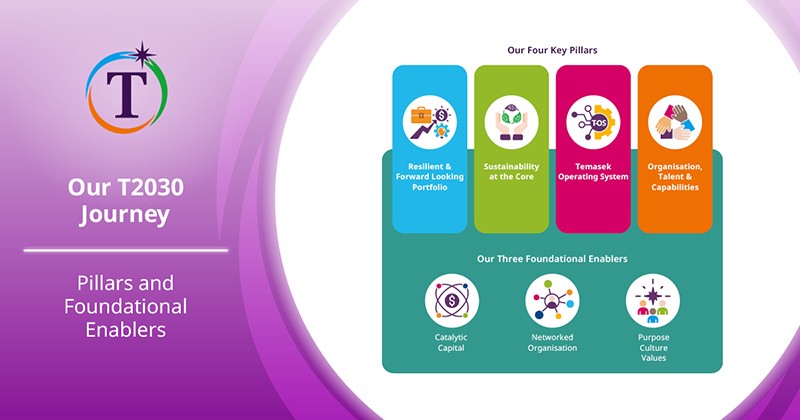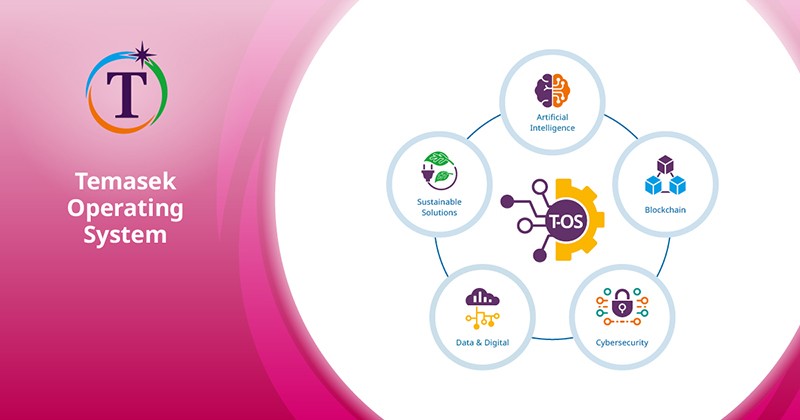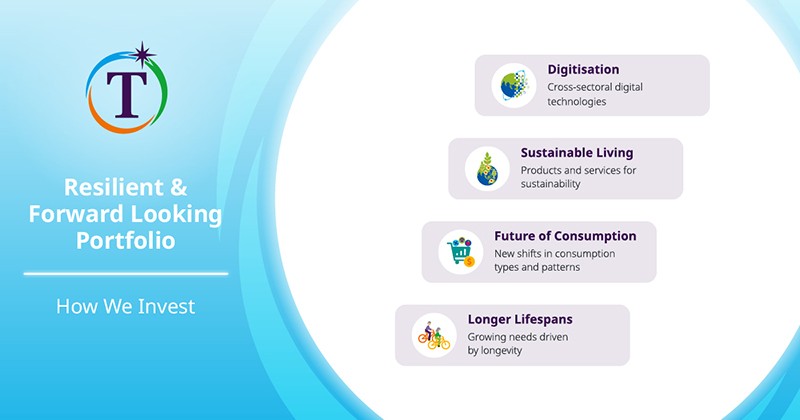Navigating a Complex World
As part of our T2030 strategy, we identified six key issues that pose current and future challenges and opportunities.
Jump to
In 2019, the Temasek senior management team conceived our T2030 strategy to guide our scenario and strategic planning, capability building, and institutional development initiatives. Our world was and is still changing across all spheres from social, economic, and political to the environment, and we wanted to be prepared for the road ahead. The Board endorsed and approved the strategy in July 2019.
The strategy reflects the importance we place on staying agile and being adaptable. We must be quick to probe, sense, and respond to the changing environment. Anchored by clear thinking and judgement, we anticipate emerging trends that are around the corner.
It is crucial to have a viewpoint on how the world would be like in this decade.
It is crucial to have a viewpoint on how the world would be like in this decade. This will enable us to be astute in scoping out current and future challenges and opportunities. To this end, we identified six top-of-mind issues.
It is crucial to have a viewpoint on how the world would be like in this decade.
1. Persistent Inflation, Restrictive Macro Policy, Lower Growth

Inflation is expected to ease only gradually in developed markets but will remain elevated in the near term relative to the past decade. Therefore, macroeconomic policy needs to remain restrictive. Lower growth and the risk of stagflation remain. These factors create a more challenging environment with increasing costs and market volatility.
Global Real GDP Growth and Global Inflation Rate (%)
- Real GDP Growth
- Inflation
- 2010-2019 Average Inflation
2. Geopolitical Events and Decoupling in a Post-COVID World

The world is becoming more fragmented, as geopolitical tensions escalate between the US and its allies and China. Government actions could well lead to the decoupling of intertwined supply chains and value-generating ecosystems which are the cornerstones of globalisation, in order to ameliorate vulnerabilities premised on national security and strategic competition considerations. Where the world heads will hinge on how the US-China relationship pans out in the coming years. However, what is clear is that decoupling will drive up inflation and business costs.
The Russia-Ukraine conflict also has far-reaching implications for Europe and the world. Sanctions on Russian fossil fuel supplies have led to an energy crisis. Food supplies to many countries have been disrupted with two of the world’s largest exporters of wheat and other crucial crops at war for the second year.
3. Foreign Investment Regimes

The trade and investment regulatory environment has become more complex. Foreign investment regimes have increased significantly in the past few years, accompanied by heightened regulatory scrutiny and greater enforcement actions. Rising nationalism is sweeping the world with more countries adopting measures to protect national assets and critical industries. Governments are tightening trade and investment restrictions and scrutinising trade deals. A fragmented world will be a poorer one. The International Monetary Fund estimates trade restrictions will lead to global output losses of close to 2%. However, these losses will be felt most acutely by emerging markets and developing economies, both of which will experience reduced investment and lower productivity gains as the transfer of better technologies and know-how from advanced economies may be curtailed.
4. Sustainability and Climate Change

Concerns about energy security and affordability, including the effects of the Russia-Ukraine war, have disrupted progress on energy transition. Decarbonisation efforts in the short term have slowed, even as the build-out of low carbon solutions in the long term accelerated, albeit at a pace and scale insufficient to address the climate crisis. It has also become evident that the impacts of nature loss, ecosystem degradation, water scarcity, and plastic pollution will have far-reaching consequences for economies and societies.
Addressing these challenges requires the collective efforts of governments, businesses, and societies. Governments are stepping up adoption of various policy tools, such as mandates and phase outs, trade restrictions, and carbon pricing (including carbon border adjustment mechanisms), as well as incentives to encourage accelerated decarbonisation across industries. As physical risks of climate change increasingly manifest, it is important for organisations to prepare for an operating environment where environmental externalities need to be internalised. New global sustainability disclosure standards, such as the ones developed by the International Sustainability Standards Board, will help drive increased levels of transparency and accountability.
5. Cyber Risks

Cybersecurity breaches have grown exponentially with organisations and individuals falling victim to cybercrimes such as data breaches, phishing, and ransomware attacks. The pandemic has accelerated the adoption of digital technologies and increased exposure to cyber attacks. Furthermore, the shifting focus and evolving techniques of malicious actors have resulted in more successful and impactful attacks on organisations. In 2022, there were over 24 billion stolen credentials, of which a sizeable portion is available on the dark web. Cybercrime is also expected to grow by 15% per year and cost the world US$10.5 trillion annually by 2025. The advances in technologies like 5G connectivity, Artificial Intelligence, and Web 3.0 will only amplify this trend.
We have introduced measures to strengthen the cybersecurity systems of our firm and those in our ecosystem.
Temasek has introduced measures to strengthen the cybersecurity systems of our firm and those in our ecosystem. Cyber resilience is now part of a company’s licence to operate. It is essential to the sustainability of businesses and enables business resilience.
6. Industry 4.0 and Workforce 4.0

While Industry 4.0 has boosted economic productivity, it has also led to social challenges such as job displacements and rising inequality. There is a growing demand for highly skilled workers, and greater displacement of workers whose jobs have been replaced by automation, and may be affected by generative Artificial Intelligence. The result is a job market with a hollowing out of the middle. This explains growing disillusionment among middle skilled workers who are worried about their job security or that their incomes and those of their children in the future will stagnate. This has led to a sense of disenfranchisement particularly among the middle income population in some countries. We must guard against fractured societies and fraying social compacts which give rise to worrying trends such as extremism and xenophobia. As companies embrace the opportunities of Industry 4.0 and transform their businesses, there is a need to consider the transformation of the workforce, with job redesign and skilling, reskilling, and upskilling.
Temasek is committed to building a social compact where everyone has opportunities to progress in life.
As a long term generational investor, Temasek is committed to building a social compact where everyone has opportunities to progress in life. We want to ensure that there is sustainable and inclusive growth, so this and future generations prosper.


